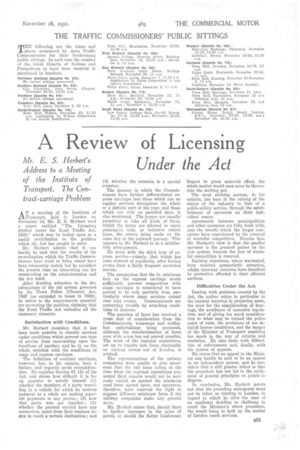A Review of Licensing Under the Act
Page 77

If you've noticed an error in this article please click here to report it so we can fix it.
Mr. E. S. Herbert's Address to a Meeting of the Institute of Transport. The Contract-carriage Problem
A T a meeting of the Institute of sa_Transport, held in London on November 14, Mr. E. S. Herbert read a paper entitled 'The Licensing System under the Road Traffic Act, 1930," which may be looked upon as a useful contribution to the problem which the Act has sought to solve.
Mr. Herbert admits that it can hardly be said that the results of the co-ordination which the Traffic Commissinners have tried to bring about have been adequately tested, but he considers the present time an interesting one for commenting on the administration and the Act itself.
After drawing attention to the disadvantages of the old system governed by the Town Police (Clauses) Act, 1847 (as extended to buses in 1888), be refers to the requirements essential for correcting the position, claiming that the Road Traffic Act embodies all the necessary elements.
Satisfaction with Conditions.
Mr. Herbert considers that it has been made possible to classify services under conditions which prevent one type of service from encroaching upon the functions of another, and he is, on the whole, satisfied with the conditions of stage and express carriages.
The definition of contract carriages, however, has, in his opinion, been a failure, and urgently needs reconsideration. He explains Section 61 (2) of the Act, and shows how difficult it is for an operator to satisfy himself (1) whether the members of a party travelling in a vehicle for which he receives payment as a whole are making separate payments to any person; (2) how that party was got together ; (3) whether the persons carried have any connection, apart from their COMMO112 desire to reach a certain destination ; and (4) whether the occasion is a special occasion.
The manner in which the Commissioners have further differentiated express carriages into those which run on regular services throughout the whole or a definite part of the year, and those which run only on specified days, is also mentioned, The former arc usually permitted to take all kinds of fares, whilst the latter are allowed to carry passengers only, at inclusive return fares, the return being made on the same day as the outward journey. This appears to Mr. Herbert to be a satisfactory arrangement.
He deals with the third type of express service—namely, that which has some element of regularity, after having grown from a fairly frequent excursion service.
The assumption that the 1s. minimum fare on the express carriage would sufficiently prevent competition with stage carriages is considered to have proved to be only partially true, particularly where stage services extend over long routes. Commissioners are preventing trouble by attaching conditions to licences.
The question of fares has received a great deal of consideration from the Commissioners, tramways and trolleybus undertakings being protected, although the standardization of fares over wide areas has not proved possible. The work of •the regional committees, set up to inquire into fares chargeable on various routes out of London, is praised.
The representatives of the railway companies were unable to give assurance that the rail fares ruling at the time when the regional committees presented their reports would not be seriously varied, as against the minimum road fares agreed upon, and operators, therefore, have reserved the right to suggest different minimum fares if the railway companies make any general move.
Mr. Herbert states that, should there be further increases in the price of petrol, or should the Salter Conference Report be given material effect, the whole matter would once more be thrown into the melting pot.
The most striking success, in his opinion, has been in the raising of the status of the industry to that of a public-utility service, through the establishment of operators on their individual routes.
Agreements between municipalities and other operators are fully dealt with, also the benefit which the larger companies have experienced by the removal of wasteful competition. Despite this, Mr. Herbert's view is that the smaller operator is the greatest gainer by the new system, because the fear of wasteful competition is removed.
Railway objections, where warranted, have received sympathetic attention, whilst tramway concerns have benefited by protection afforded to their efficient services.
Difficulties Under the Act, Dealing with problems created by the Act, the author refers in particular to the expense incurred in preparing cases, the need for the simplification of hearings, the avoidance of excessive regulation, and of giving too much consideration to what may be termed the police point of view, the avoidance of too detailed licence conditions, and the danger of the Minister of Transport requiring too much in the way of returns and statistics. He also deals with difficulties of enforcement and, finally, with the system of appeals.
He states that an appeal to the Minister can hardly be said to be an appeal to an independent person, and he considersthat a still greater defect is that the procedure has not led to the settlement of general principles on points in dispute.
In conclusion, Mr. Herbert points out that his preceding statements must not be taken as relating to London, in regard to which he cites the case of an applicant deciding to challenge in court the Minister's whole procedure, the result being to hold up the matter of London coach services.




















































































































